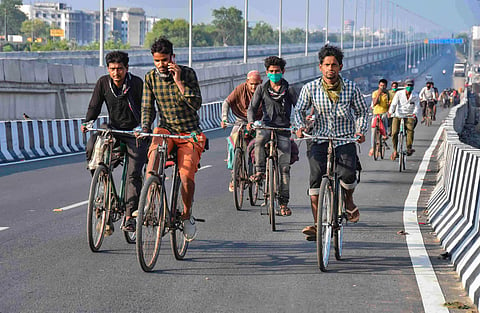

NEW DELHI: Four days before the ongoing lockdown is due to end, the Centre on Wednesday allowed migrant workers, tourists, students and other persons stranded in different parts of the country to move to their states, fulfilling the long-pending demand of lakhs of distressed people.
Announcing the relaxation with certain conditions, the Union Ministry of Home Affairs directed states and Union territories to designate nodal authorities and “develop standard protocols for sending and receiving such persons”.
Union Home Secretary Ajay Bhalla said buses shall be used for transport of such groups of stranded people and these vehicles will be sanitised and will have to follow safe social distancing norms in seating.
However, the MHA did not specify whether a person or a family can travel in a private vehicle, and if allowed, under what conditions.
“Due to lockdown, migrant workers, pilgrims, tourists, students and other persons are stranded at different places. They would be allowed to move,” Bhalla said.
The nodal authorities shall also register the stranded persons within their states and Union territories, the order stated.
The Centre’s decision comes as a big relief to lakhs people stranded in different parts of the country, away from their native places.
Persons willing to move will be screened and only those having no symptoms will be allowed to proceed. Both the sending and receiving states will have to coordinate on the movement, and the states that fall in the route will allow the transit of such buses. Upon arrival at the destination, the persons will be screened again and kept in-home quarantine. They may also be kept in institutional quarantine, if required, after health check-up.
“They would be kept under watch with periodic health check-up,” the order said.
Earlier this month, MHA had told the Supreme Court that over 10.3 lakh migrant workers are housed in relief camps run by state governments or NGOs. According to labour ministry sources, the number could be as high as 20 lakh migrant workers as the Centre is yet to get a response from some states on migrant workers.
While announcing the lockdown on March 24, PM Narendra Modi had made it clear that people should remain wherever they are. In the initial days of the lockdown, thousands of the migrant workers started moving by foot from cities like Delhi, Mumbai and Hyderabad to their respective places, leading to a humanitarian crisis.
At least 25 migrant workers have reportedly died while walking back to their homes during the shutdown. There have been at least three protests by migrant workers in Surat, Gujarat in recent weeks as they have been demanding passage to their home states. About a fortnight ago, hundreds gathered in Mumbai’s Bandra after there were rumours of trains resuming operations to North India.
All those people who avail the opportunity “may be encouraged to use Aarogya Setu app through which their health status can be monitored and tracked,” according to a government order.
Though several states, including Uttar Pradesh, Uttarakhand, Gujarat, Punjab, Assam, Chhattisgarh and Rajasthan, have brought back thousands of students and tourists, many remain stuck.Bihar has been an exception. The Nitish Kumar government has been saying that people should remain wherever they are during the entire period of the lockdown.
Expect more relaxations from May 4
New guidelines to fight COVID-19 will come into effect on May 4, which will give considerable relaxations to many districts. Details regarding the new norms will be communicated in the days to come, MHA said
Ferrying them by road in sanitised buses
States and Union territories should designate nodal authorities and develop standard protocols for receiving and sending stranded persons
If a group of stranded persons wish to move from one state to another, the two states may consult each other and mutually agree to the movement by road
Sanitised buses to be used; must follow social distancing norms in seating. Upon arrival at the destination, they would be screened and kept in quarantine